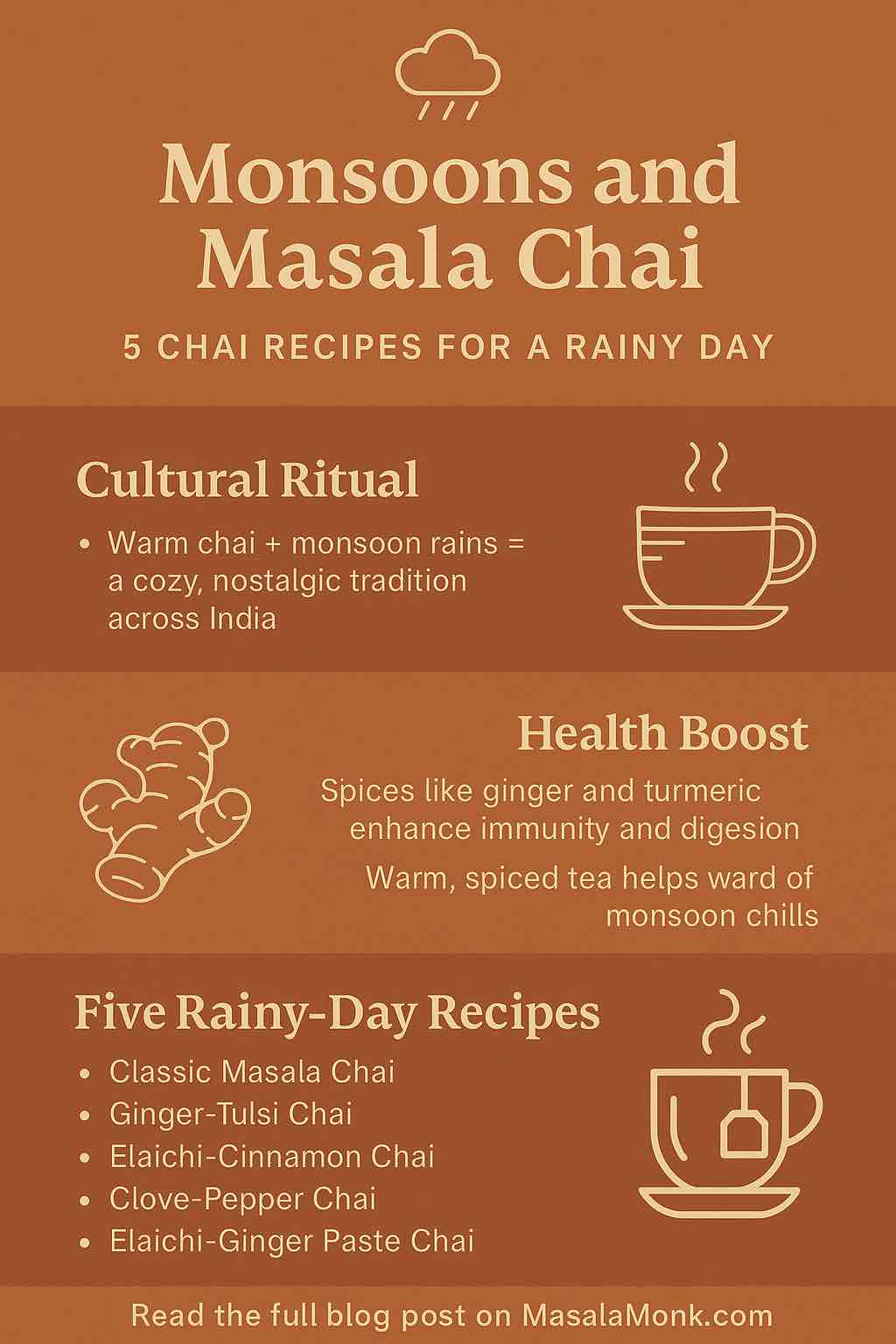
There are few pleasures more universally loved in the Indian subcontinent than sipping on a steaming cup of masala chai during the monsoons. The steady rhythm of raindrops, the earthy scent of petrichor, and the comforting warmth of chai create a sensory symphony that soothes and revives.
But beyond comfort and nostalgia, monsoon chai has a deeper relevance: health, tradition, and seasonal alignment. In this blog, we’ll explore the cultural connection, health science, and five practical masala chai recipes designed specifically for rainy days. Let’s dive in!
🌧️ Chai and the Monsoon: A Timeless Pairing
For centuries, chai has been more than just a beverage in India—it’s a daily ritual, a moment of pause, and a form of social connection. During the monsoon, chai evolves from habit to necessity. Why?
- Immunity and Digestion: Monsoon dampness can reduce immunity and slow digestion. The spices in masala chai—ginger, cardamom, cloves, cinnamon, and black pepper—help stimulate digestive fire (“agni”) and strengthen the body’s defenses.
- Thermal Comfort: The body naturally seeks warmth during cooler, rain-soaked days. Chai provides internal heat through both temperature and thermogenic spices.
- Mood Upliftment: Studies confirm that warm beverages trigger comfort and pleasure centers in the brain. Add a cozy blanket and window view, and you’ve got monsoon therapy in a cup.
🧕 The Science of Spices in Chai
Here’s a breakdown of the spices commonly used in monsoon chai, backed by science:
- Ginger (Zingiber officinale): Anti-inflammatory, relieves nausea, improves digestion.
- Cardamom (Elettaria cardamomum): Diuretic, aids bloating, breath freshener.
- Cloves (Syzygium aromaticum): Antimicrobial, pain-relieving.
- Cinnamon (Cinnamomum verum): Blood sugar regulator, anti-fungal.
- Black Pepper (Piper nigrum): Enhances bioavailability of other spices, supports respiratory health.
- Tulsi (Holy Basil): Adaptogen, antibacterial, fights cold and flu.
Research published in the Natural Medicine Journal (2024) supports the synergistic effect of these spices in reducing inflammation, boosting immunity, and improving gut health.
☕️ Five Practical Chai Recipes for Rainy Days
These recipes are grounded in traditional practices but adapted for modern kitchens. Each serves 2 cups.
1. Classic Masala Chai (“Kadak” Style)
Ingredients:
- 1 cup water
- 1 cup milk (or oat/almond milk)
- 2 tsp loose black tea (Assam preferred)
- 1″ fresh ginger (sliced)
- 2 cardamom pods (crushed)
- 1 small cinnamon stick
- 2 cloves
- 2 black peppercorns
- Sugar or jaggery to taste
Method:
- Boil water with all spices and ginger for 3-4 mins.
- Add tea leaves, simmer for 2 mins.
- Add milk and sugar, bring to a boil.
- Simmer for 1 min, strain and serve hot.
2. Ginger-Tulsi Immunity Chai
Focus: Cold/flu prevention
- Add 8-10 fresh tulsi leaves + 1.5″ grated ginger
- Skip cinnamon for a sharper, herbal profile
3. Cinnamon-Cardamom Comfort Chai
Focus: Lighter spice, gentle comfort
- Use only 1 cinnamon stick + 3 cardamom pods
- Sweeten with honey after straining (not while boiling)
4. Clove-Pepper Digestive Chai
Focus: Post-heavy meal or rainy evening snack
- Increase cloves to 4 and peppercorns to 3
- Great with pakoras or khichdi
5. Quick Elaichi-Chai Paste (For Busy Days)
Make-ahead paste:
- Blend 1/4 cup cardamom + 1/4 cup fresh ginger + splash of water
- Store refrigerated up to 5 days
- Use 1 tsp per cup while boiling water
🔹 Tips for the Perfect Monsoon Chai
| Tip | Why It Matters |
|---|---|
| Toast spices | Unlocks essential oils for richer aroma |
| Simmer patiently | Avoids bitterness, deepens flavor |
| Balance milk-water | Too much milk mutes spice; 1:1 or 1:2 is ideal |
| Use jaggery over sugar | Lower glycemic index, more minerals |
🍽️ Pairings to Elevate the Experience
Chai is best enjoyed with simple, hearty monsoon snacks:
- Pakoras (fritters)
- Aloo Bonda
- Vada Pav
- Roasted Bhutta (corn on the cob)
- Khichdi with pickle
📅 Final Thoughts
Chai in the monsoon is more than a culinary tradition; it’s a sensory, emotional, and physiological ritual. Whether you’re curled up with a book, chatting with friends, or watching the rain fall in silence, a well-brewed cup of masala chai connects you to generations of wisdom and comfort.
So this rainy season, skip the instant tea powders and embrace the slow brew. Let your kitchen fill with the scent of simmering spices, and raise a cup to the rain.
Which recipe will you try first? Or do you have a family chai blend you’d like to share? Let us know in the comments!
🔍 Frequently Asked Questions (FAQs)
1. Can I make masala chai without dairy milk?
Absolutely. You can use oat, almond, or soy milk as a substitute. Oat milk offers the creamiest texture, while almond adds a nutty undertone.
2. What type of tea is best for masala chai?
Strong, robust black tea like Assam is ideal. Avoid delicate teas like Darjeeling—they get overwhelmed by the spices.
3. Is masala chai healthy during the monsoon?
Yes. The spices in chai (ginger, tulsi, pepper, etc.) enhance immunity, support digestion, and counter monsoon-related respiratory issues.
4. How can I reduce sugar but still enjoy the flavor?
Use jaggery or a small amount of honey (added after boiling). You can also add cinnamon or fennel for natural sweetness.
5. Can I reuse the chai spices?
It’s not recommended. Most spice benefits and essential oils are released in the first boil. Reusing can result in weak flavor and lower benefits.
6. What if I don’t have fresh ginger or tulsi?
You can use dried ginger powder (1/4 tsp) and dried tulsi leaves (crushed). However, fresh ingredients yield more aroma and potency.
7. Is it okay to drink chai multiple times a day?
Yes, in moderation. 1–2 cups is fine. Avoid drinking it on an empty stomach or late at night due to caffeine content.
8. Can I make a chai blend or premix at home?
Yes. Dry roast and grind spices like cardamom, ginger, cloves, and cinnamon. Store in an airtight jar and use ½ tsp per cup.
9. What snacks go best with monsoon chai?
Crispy or warm comfort foods like pakoras, samosas, roasted bhutta, or even mild khichdi with achar (pickle).
10. How can I intensify chai flavor without overboiling?
Toast the spices before boiling, crush fresh ginger/cardamom, and simmer uncovered. Use less milk if flavors seem muted.














